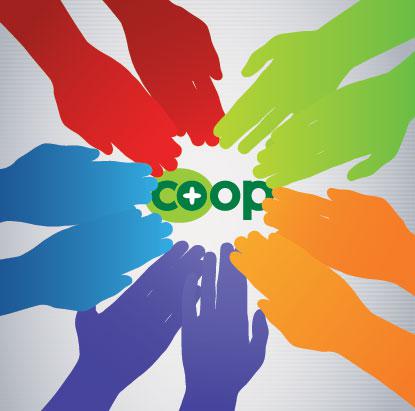Stronger Together Works in HR, Too

When working with Outpost Co-op managers on a particularly sticky employee issue, I often hear, "I’m glad I don’t have your job!" Although I may think the same thing of someone else’s job, the fact is the role of a human resources (HR) manager can be very lonely at times.
The loneliness stems from the decisions that weigh on our shoulders, combining complex employment laws, confidential information, employees’ livelihood, conflicts of interests, and more. Add to that our unique co-op cultures! Sometimes, especially if you are a lone HR department, you can’t confide in very many internal colleagues. Because of this, HR folks have learned to be resourceful in seeking guidance and feedback on our decisions.
In 2005, National Cooperative Grocers Association (NCGA) western corridor HR managers began meeting by phone and then held an in-person networking workshop to provide support and share resources with each other. As this group evolved and met more formally, they opened their annual workshop to HR managers from all co-ops. During the past four years, a growing group of managers and other co-op staff with HR duties have held an annual HR conference.
Each conference has revolved around one main topic—such as team-building, coaching, managing difficult conversations—with additional time structured for sharing and learning from each other. In 2010 and 2011, the conference was approved for recertification credit hours through the HR Certification Institute (www.hrci.org). This past year, we added store tours and peer workshops to the agenda, making the two-and-a-half days of the conference jam-packed with learning.
This past October, we got together in Milwaukee, home to Outpost Natural Foods Cooperative, with the theme of "Co-op culture: assessing, shaping, and changing it." At the conference, we learned a lot about culture—what it is and why it’s important. Culture is the "operating system" that an organization works within. It is also the "mood" of the organization, and employees, customers, and business relationships are affected by that mood. Culture is important because it is a main factor in determining what you can and cannot do.
Assessing your culture
Not all organizations need to change their culture. But there are some signals that may indicate a need for culture change either at an organizational or departmental level. Signs include the inability to do something as an organization that you really want to do, recurring issues, turnover of top-performing staff, or having a future vision that is the opposite of or far from where you are today.
There are many ways to assess your culture: interviews, surveys, observation, reviewing organizational policies and literature. There are also formal organizational assessment tools such as the Organizational Culture Assessment Instrument (found at www.ocai-online.com).
Assessing your culture and using these tools will not tell you exactly what to fix or how to fix it, but they will provide you direction or guidance. Our presenter, Craig Fleck of Demeter Matrix Alliance, gave us good advice, stating, "The tools are not meant to give us the answers; they are meant to get us to the right conversations." Discussions included tactics to take these tools home to our co-ops to get conversations started with the right people.
Our parting lesson on culture was that changing a culture should not be attempted without full leadership support. Leadership is essential for effectively communicating the future, making sure the right resources are available, modeling the expectations of the co-op, and continually paying attention to progress.
Sharing and learning
At our conference, besides the topic of culture, we also learned from our peers in break-out sessions that covered a variety of topics:
Fundamentals of HR—for newer HR professionals, covering compensation, benefits, staffing, employee relations, compliance, and recordkeeping.
Rethinking evaluations—sharing a co-op’s story about changing their evaluation process and where they were one year later.
Bounce: career resilience—learning how to apply resilience strate gies to your work.
A basic overview of ADAAA (Americans with Disabilities Act Amendments Act)—helping us apply resources to our increasing ADAAA case loads.
Recruiting and interviewing, plus health insurance options—both sessions sharing best practices.
Open HR forum for small co-ops—helping smaller co-ops with their unique HR issues and questions.
Developing and implementing a salary administration program—teaching how to use data to design and roll out the right salary administration program for our co-ops.
With such a rich and full agenda, one might wonder if a conference could get any better. Truthfully, the best part of the conference was the connections we made as HR and co-op professionals. In every spare moment, we were sharing ideas and helping each other work through tough situations that were current at our co-ops. It was HR therapy at its best! Knowing that everyone understands the confidentiality of our situations, we could open up, spill our guts and horror stories, and discover there is almost always a situation worse than the one we’re wrestling with.
Participant comments regarding what was most valuable from the conference included: "Got to work through a major issue/situation with knowledgeable peers—now I am validated and have a plan!’" "Renewed enthusiasm for my career." and "Networking, realizing my struggles are shared by others."
It felt really good to be with a group of peers learning together, supporting each other, and putting faces to names. In this HR cooperative atmosphere, we felt far from lonely!
Watch for information this summer on the 2012 HR managers’ -conference, sponsored by NCGA. If you want to make sure information is sent to you directly, or you have suggestions about topics or workshops for this year’s conference, contact Karen Zimbelman at karen.zimbelman@ncga.coop. Planning begins in late spring, sometimes including a lunch-time discussion at the June CCMA conference. Let us know if you’re interested in being involved.







